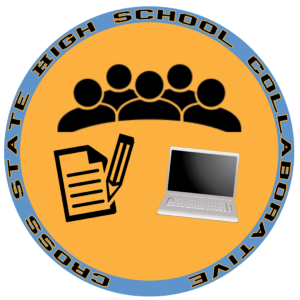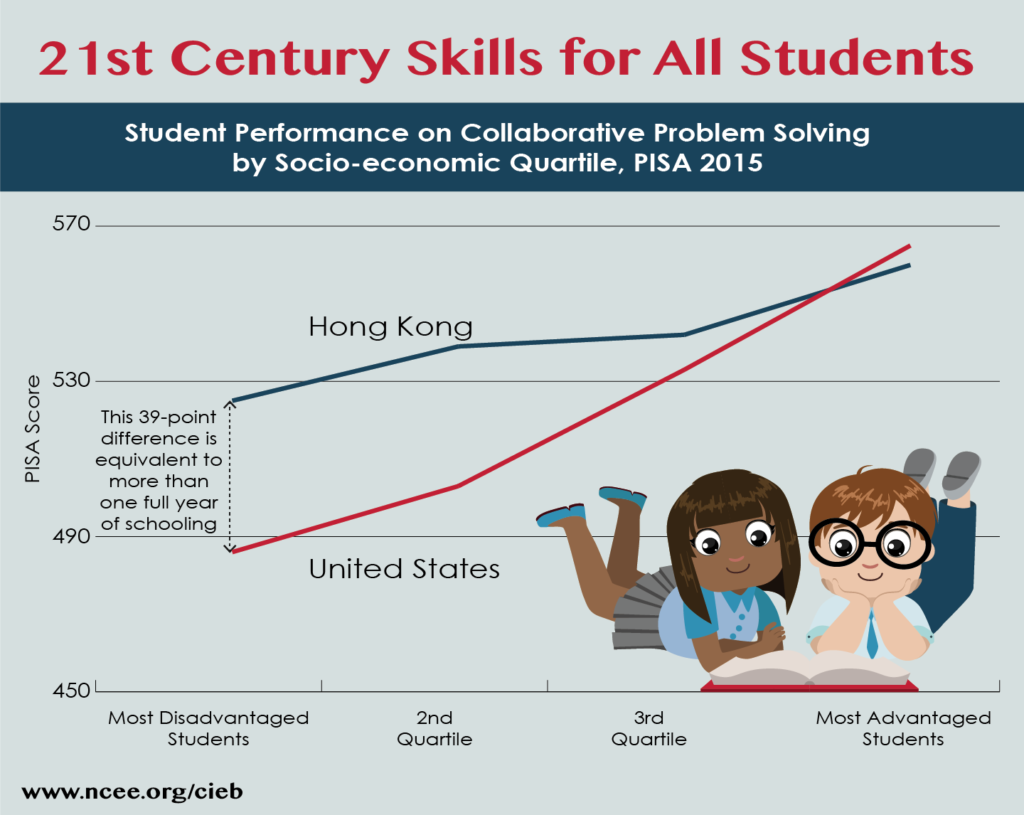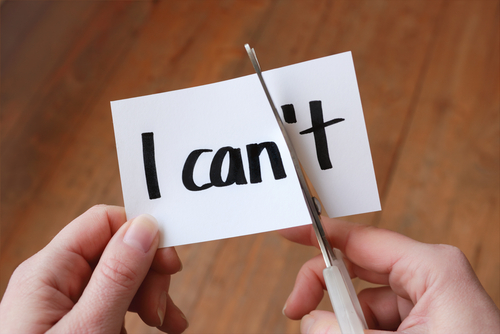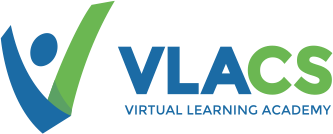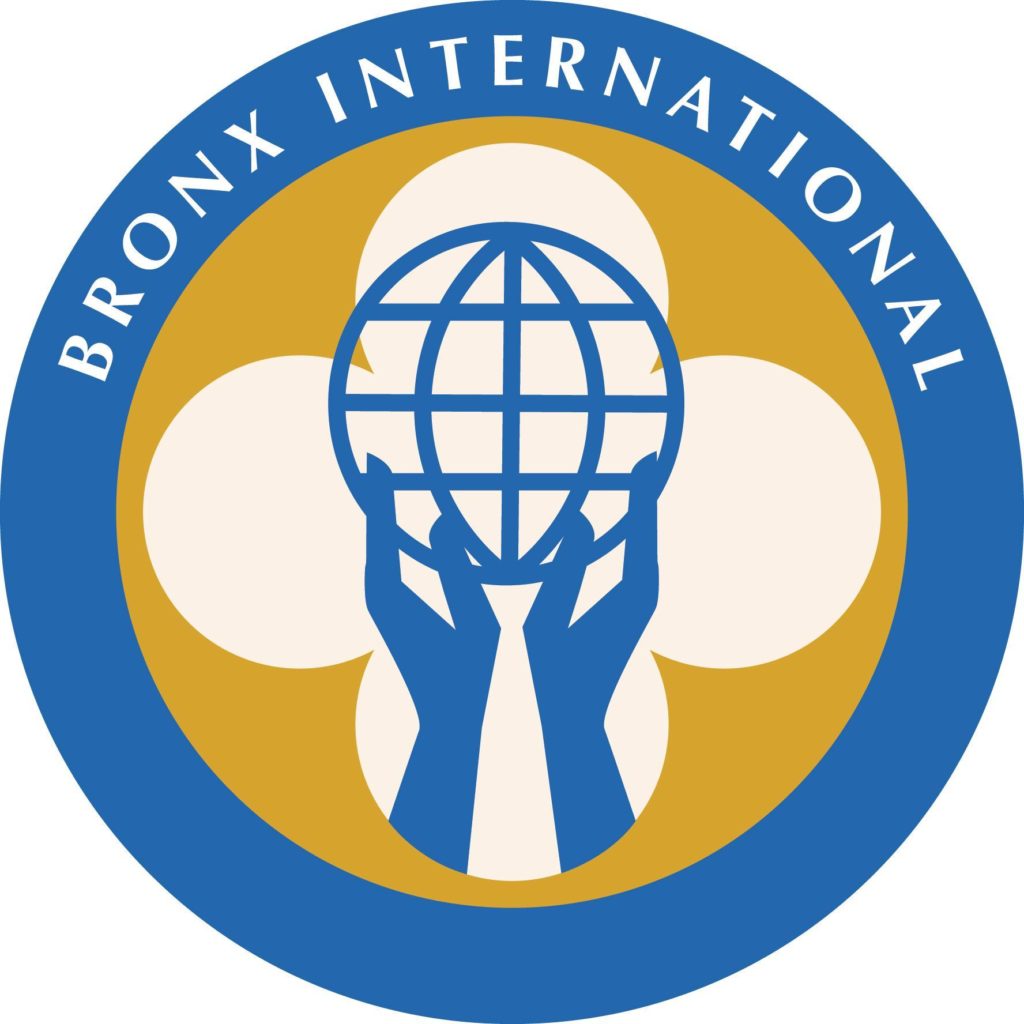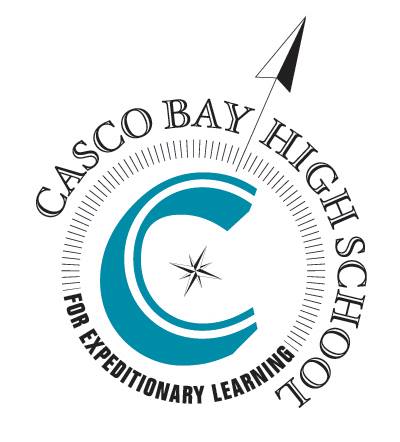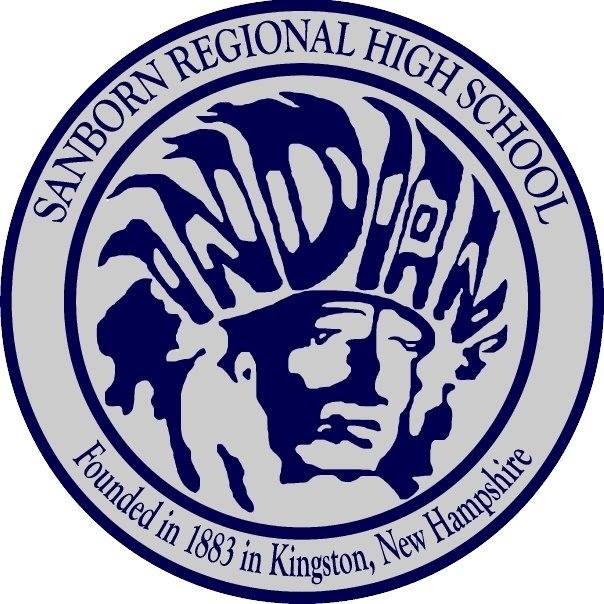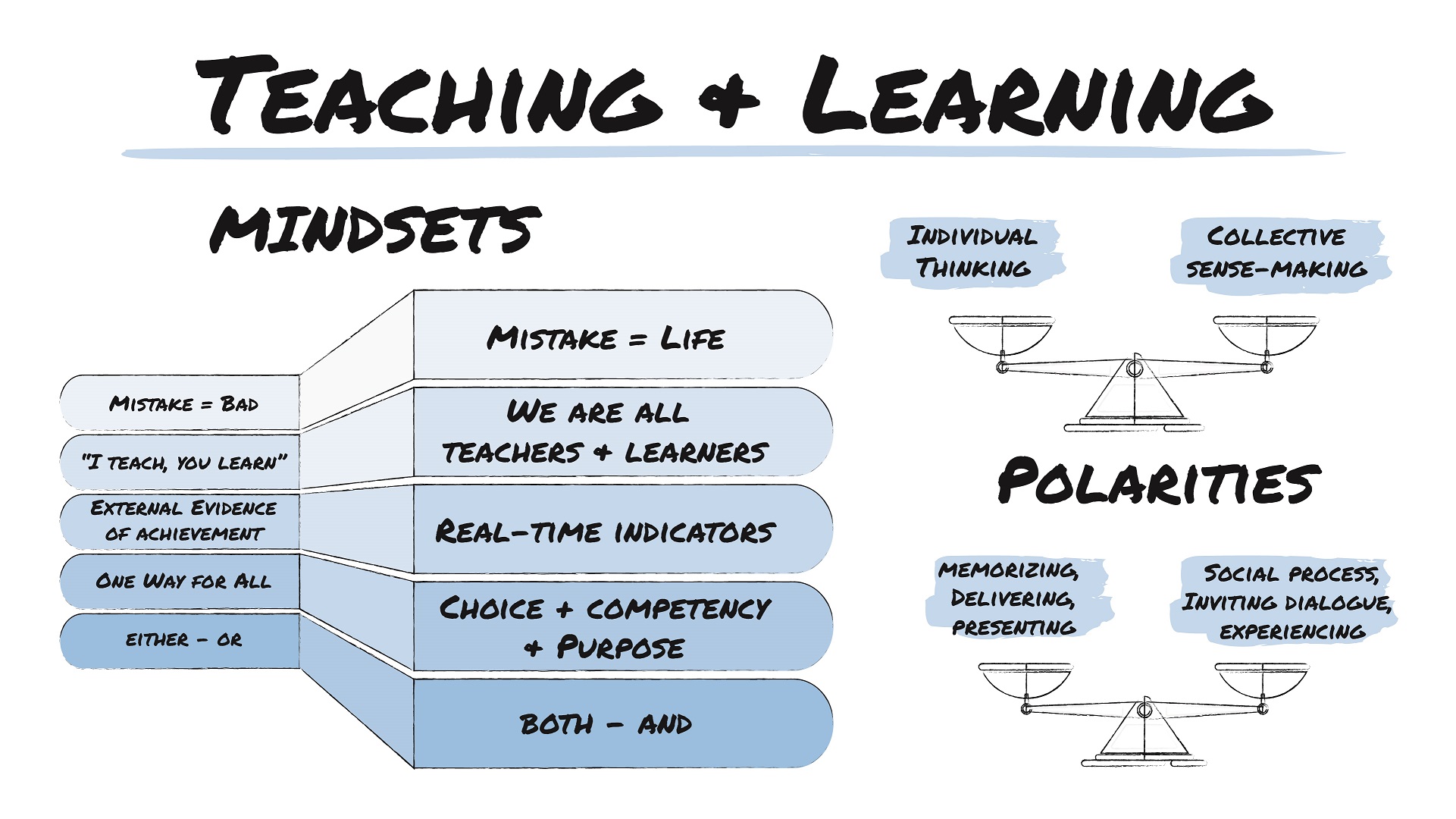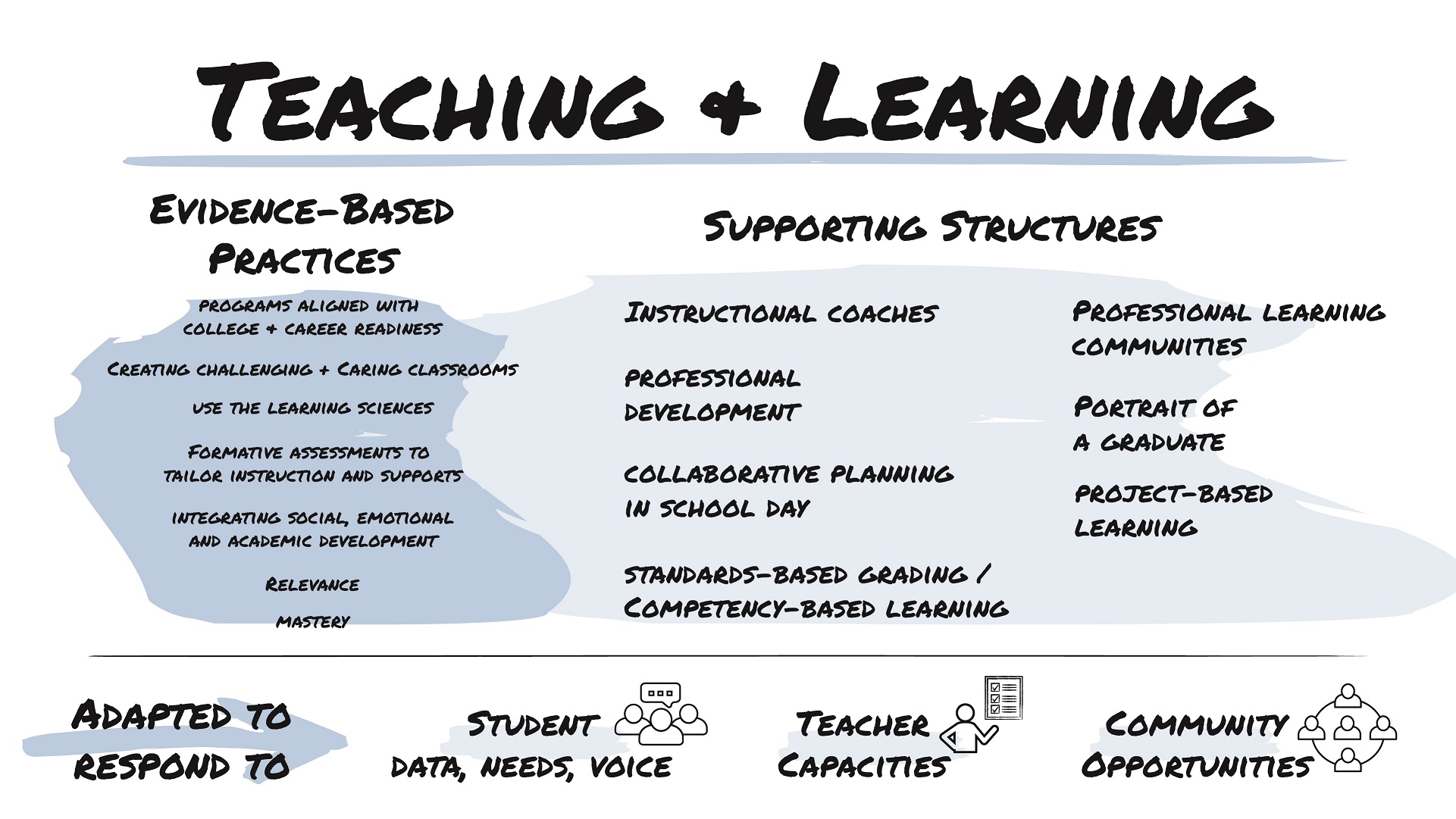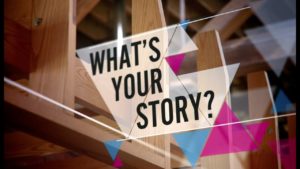Teaching & Learning
Using the evidence base to focus redesign efforts on how to best stage and sequence teach and learning to build the necessary teacher, leader, and student capacities in supportive and achievable manners.
What the Evidence Says
These resources are summaries and synthesis of the evidence base for high school improvement and significant individual studies on key redesign and improvement practices.
Creating Caring & Challenging Classrooms
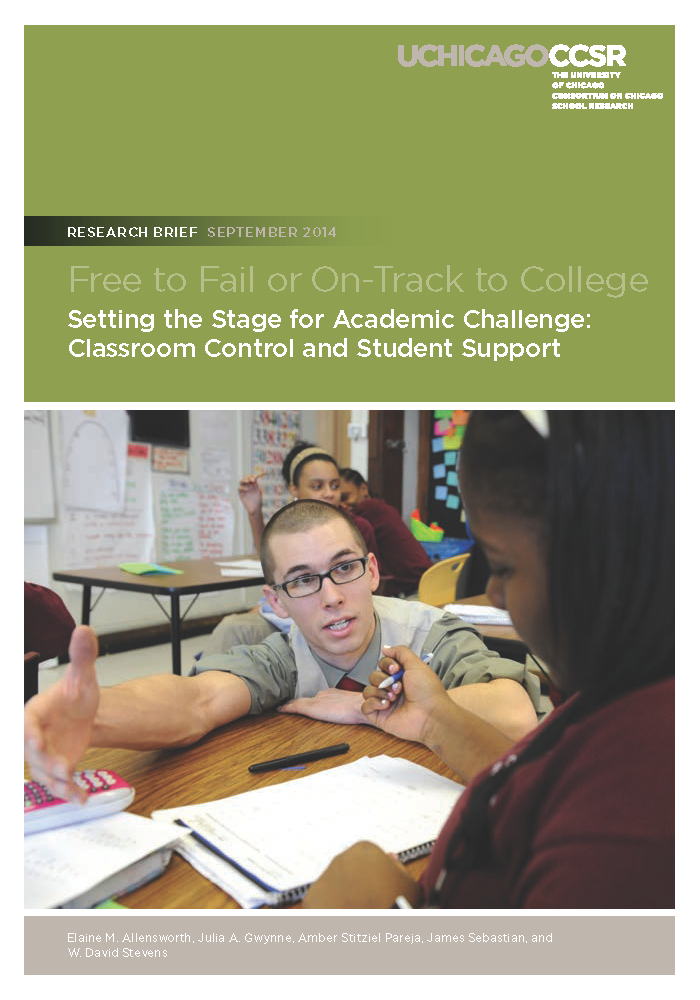 Free to Fail or On-track to College these studies suggest that increasing the challenge (rigor) of high school curriculum is unlikely to improve student achievement without concurrent improvements in teachers’ abilities around classroom management and academic support; asking students to do more challenging work can have both beneficial and adverse effects, depending on elements of the classroom instructional environment. Download the Report (PDF)
Free to Fail or On-track to College these studies suggest that increasing the challenge (rigor) of high school curriculum is unlikely to improve student achievement without concurrent improvements in teachers’ abilities around classroom management and academic support; asking students to do more challenging work can have both beneficial and adverse effects, depending on elements of the classroom instructional environment. Download the Report (PDF)
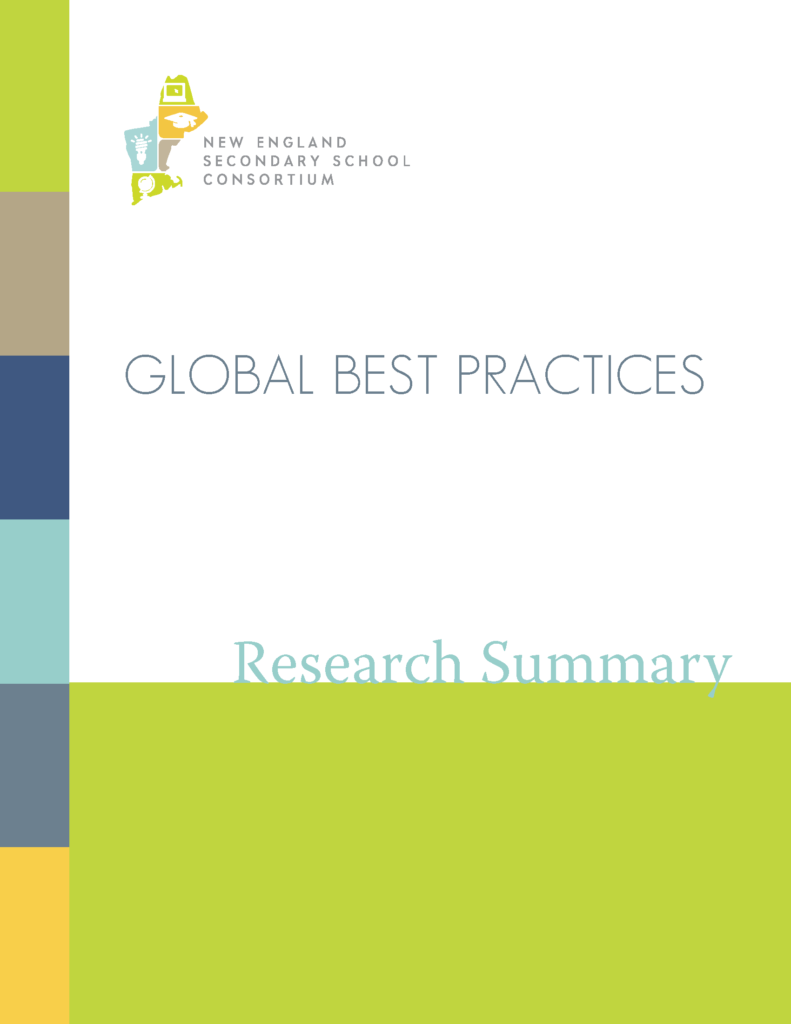 Global Best Practices: An Internationally Benchmarked Self-Assessment Tool for Secondary Learning was created by the New England Secondary School Consortium to equip high schools with a clearly articulated, step-by-step process they can follow to identify existing issues or needs, and to shape school-improvement plans and priorities.
Global Best Practices: An Internationally Benchmarked Self-Assessment Tool for Secondary Learning was created by the New England Secondary School Consortium to equip high schools with a clearly articulated, step-by-step process they can follow to identify existing issues or needs, and to shape school-improvement plans and priorities.
Download the Research Summary (PDF)
Download the Web-based Version
 What Matters for Staying On-Track and Graduation in Chicago Public High Schools a report prepared by CCSR which looks closely at students’ performance in their coursework during their freshman year, how it is related to eventual graduation, and how personal and school factors contribute to success or failure in freshman-year courses. Download the Report (PDF)
What Matters for Staying On-Track and Graduation in Chicago Public High Schools a report prepared by CCSR which looks closely at students’ performance in their coursework during their freshman year, how it is related to eventual graduation, and how personal and school factors contribute to success or failure in freshman-year courses. Download the Report (PDF)
- BetterLesson and PBLWorks Professional Learning at LUSD Lindsay Unified School District (LUSD) implemented a partnership with The Learning Accelerator (TLA) and software vendor Yet Analytics to examine the relationships between a variety of learning facilitator (LUSD’s preferred term for educators) and leader professional learning offerings and learner outcomes. This work is funded by a federal Teacher and School Leader (TSL) Grant. This research brief examines learning facilitators’ participation in two professional learning opportunities offered in partnership with external providers BetterLesson and PBLWorks in Grant Year 1 (2017-2018) and Grant Year 2 (2018-2019). Download the Report (PDF)
- Intergenerational Bonding in School: The Behavioral and Contextual Correlates of Student-Teacher Relationships explore the significance of social integration in the educational system, this study examined whether student-teacher relationships predicted two important student behavioral outcomes (academic achievement and disciplinary problems) Download the Report (PDF)
- Project-Based Learning A Literature Review The concept of project-based learning (PBL) has garnered wide support among a number of K-12 education policy advocates and funders. This working paper published by MDRC builds on and updates a seminal literature review of PBL published in 2000. Download the Report (PDF)
- Why do students get good grades, or bad ones? The influence of the teacher, class, school, and student from the University of Chicago Consortium on School Research that addresses three key question: 1. To what extent do students receive different grades based on: a) Their teacher for a particular class? b) The school the student attends? c) The student’s background characteristics? d) Specific conditions of the class? 2. How much of the variation in grades by teacher, school, student background, and class conditions can be attributed to students’ academic skills and efforts, as measured by test scores and attendance? 3. What are the factors that account for systematic differences in grades across classes, teachers, and schools? Download the Report (PDF)
Using the Learning Sciences
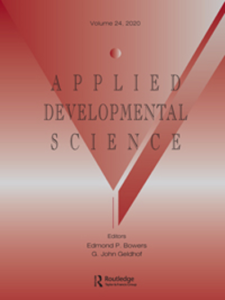 Implications for Educational Practice of the Science of Learning and Development This article draws out the implications for school and classroom practices of an emerging consensus about the science of learning and development, outlined in a recent synthesis of the research. Situating the review in a developmental systems framework, we synthesize evidence from the learning sciences and several branches of educational research regarding well-vetted strategies that support the kinds of relationships and learning opportunities needed to promote children’s well-being, healthy development, and transferable learning. In addition, we review research regarding practices that can help educators respond to individual variability, address adversity, and support resilience, such that schools can enable all children to find positive pathways to adulthood. Click to Download (PDF)
Implications for Educational Practice of the Science of Learning and Development This article draws out the implications for school and classroom practices of an emerging consensus about the science of learning and development, outlined in a recent synthesis of the research. Situating the review in a developmental systems framework, we synthesize evidence from the learning sciences and several branches of educational research regarding well-vetted strategies that support the kinds of relationships and learning opportunities needed to promote children’s well-being, healthy development, and transferable learning. In addition, we review research regarding practices that can help educators respond to individual variability, address adversity, and support resilience, such that schools can enable all children to find positive pathways to adulthood. Click to Download (PDF)
Click here to view the article online with additioinal references & data.
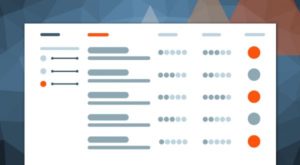 Evidence-Based Teaching & Learning Toolkits, offered through the Education Ednowment Foundation, these toolkits offer teachers the ‘best bets’ of what has worked most effectively to boost the attainment of disadvantaged students. Click for more information and to download the toolkits.
Evidence-Based Teaching & Learning Toolkits, offered through the Education Ednowment Foundation, these toolkits offer teachers the ‘best bets’ of what has worked most effectively to boost the attainment of disadvantaged students. Click for more information and to download the toolkits.
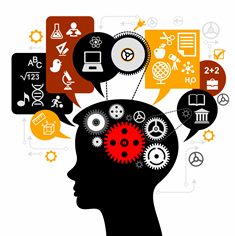 The 10 Biggest Breakthroughs in the Science of Learning, originally published by OnlinePHDPrograms.com, shares the 10 most significant breakthroughs that recent research has made on the science of learning, providing valuable insights on how to make the best use of your brain without wasting energy. View the Report
The 10 Biggest Breakthroughs in the Science of Learning, originally published by OnlinePHDPrograms.com, shares the 10 most significant breakthroughs that recent research has made on the science of learning, providing valuable insights on how to make the best use of your brain without wasting energy. View the Report
- Improving Students’ Learning With Effective Learning Techniques: Promising Directions From Cognitive and Educational Psychology improving educational outcomes will require efforts on many fronts, but a central premise of this monograph is that one part of a solution involves helping students to better regulate their learning through the use of effective learning techniques. Produced by the Association for Psychological Science. Download the Report (PDF)
- Learning and Memory Under Stress: Implications for the Classroom Research over the past two decades identified stress and the hormones and neurotransmitters released during and after a stressful event as major modulators of human learning and memory processes, with critical implications for educational contexts. Taking these insights from psychology and neuroscience into account could bear the potential to facilitate processes of education for both students and teachers. Published by the Nature Partner Journals in partnership with the University of Queensland. Download the Report (PDF)
Professional Learning Communities & Instructional Coaching
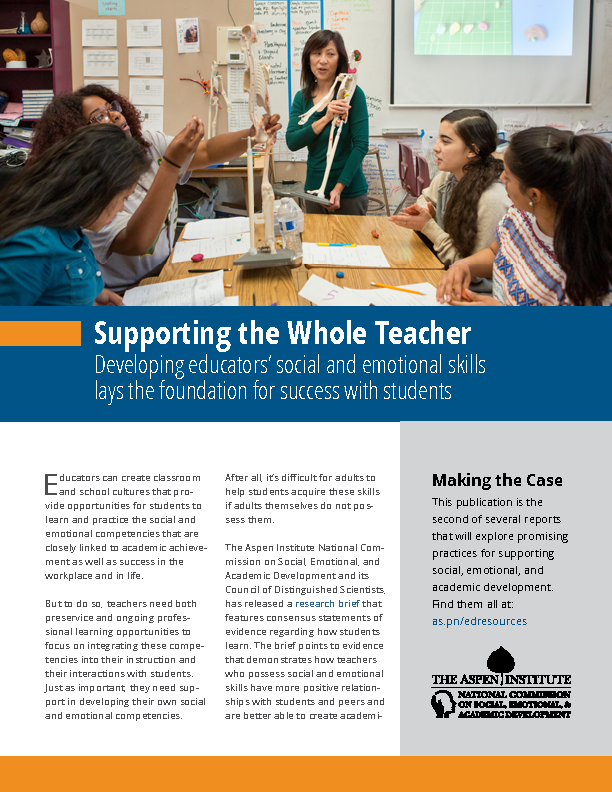 Supporting the Whole Teacher from The Aspen Institute highlights the need for teacher preparation and professional learning to both build teachers’ own social and emotional competence and prepare teachers to foster these skills in their students. The case study cites key examples of programs supporting teachers in this work including RULER, an evidence-based program that trains teachers on how to model the social and emotional behaviors they want to see in their students, and the Center for Reaching and Teaching the Whole Child, which works with teacher preparation programs to help integrate teacher and student social and emotional competencies into their classes. Download the Report (PDF)
Supporting the Whole Teacher from The Aspen Institute highlights the need for teacher preparation and professional learning to both build teachers’ own social and emotional competence and prepare teachers to foster these skills in their students. The case study cites key examples of programs supporting teachers in this work including RULER, an evidence-based program that trains teachers on how to model the social and emotional behaviors they want to see in their students, and the Center for Reaching and Teaching the Whole Child, which works with teacher preparation programs to help integrate teacher and student social and emotional competencies into their classes. Download the Report (PDF)
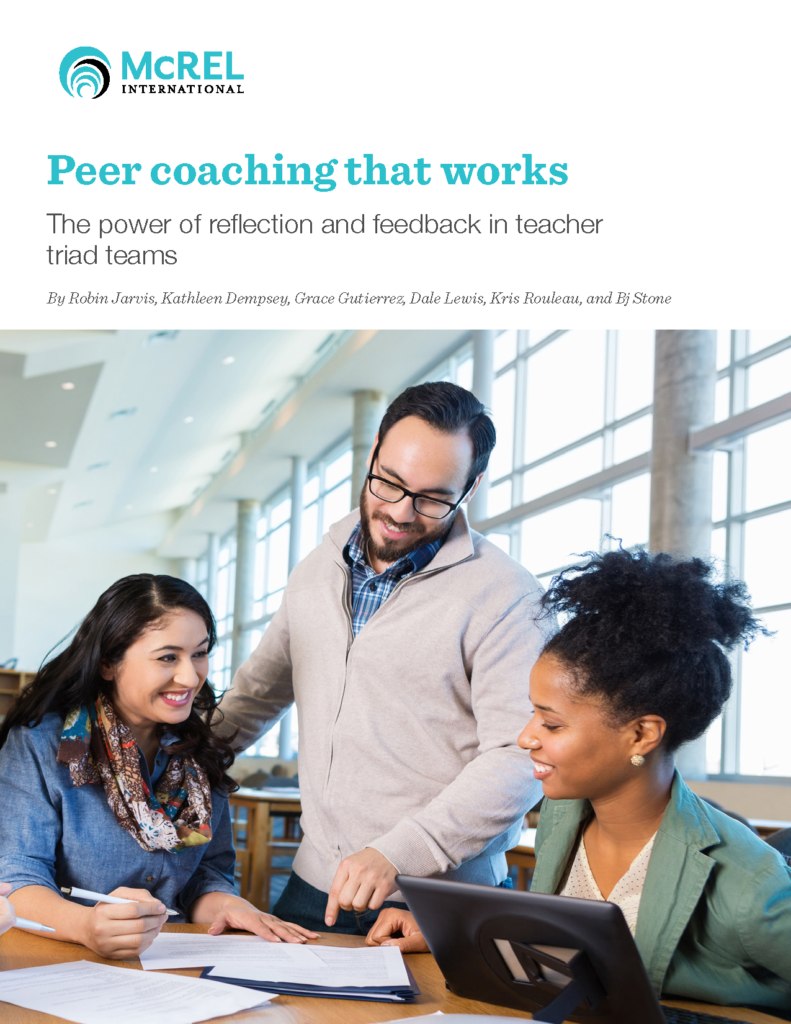 Peer Coaching that Works: The Power of Reflection and Feedback in Teacher Triad Teams this report from McRel Internationalexamines that teachers, like all professionals, should continuously grow and learn by developing new knowledge, skills, and abilities that benefit their students academically, we do not believe that a deficit-based approach to coaching is the way to get there. Download the Report (PDF)
Peer Coaching that Works: The Power of Reflection and Feedback in Teacher Triad Teams this report from McRel Internationalexamines that teachers, like all professionals, should continuously grow and learn by developing new knowledge, skills, and abilities that benefit their students academically, we do not believe that a deficit-based approach to coaching is the way to get there. Download the Report (PDF)
- The Effects of Coaching on English Teachers’ Reading Instruction Practices and Adolescent Students’ Reading Comprehension this report published in April, 2018 examines that although the use of literacy coaches is becoming more common, few research studies have shown positive effects of coaching on teacher practices and student achievement. In the current study, a cluster randomized design was used to evaluate usefulness of coaches for teachers of struggling high school students. High schools were randomly assigned across three experimental conditions: professional development workshops, workshops with written lesson materials, and workshops with lesson materials and coaching. Participants in this three-year study included 130 ninth-grade teachers and 3,160 ninth grade students. Recommended literacy practices included teacher modeling, student team discussions, and self-selected reading. Findings indicated that coaching improved teachers’ use and quality of recommended literacy practices and increased student reading achievement over the period of a year. Download the Report (PDF)
- Effective Teacher Professional Development A 2017 research brief from the Learning Policy Institute reporting on teacher professional learning is of increasing interest as one way to support the increasingly complex skills students need to succeed in the 21st century. Download the Report (PDF)
Remote Learning
Podcast: Technology & Learning
Michele Cahill hosts a conversation with experts on how to use technology as a learning asset. Featuring: Nichole Pinkard Professor at DePaul University and Founder of the Digital Youth Network Mary Ryerse Director of Strategic Design at Getting Smart Monica Martinez Former President of the New Tech Network and Co-Author of Deeper Learning. Listen to the Podcast.
- Research on Virtual Learning the spread of coronavirus throughout the U.S. has led to an unprecedented experiment in virtual learning. With schools across the country moving to an online learning model for the rest of the semester, The Learning Agency Lab looks at the research on virtual learning at https://www.the-learning-agency-lab.com/the-learning-curve/what-does-the-research-say-about-online-learning
- Covid-19 Home-Learning Resources from Fordham Institute aggregates the best resources and ideas for remote learning, including highlighting schools, teachers, and parents doing this well at https://fordhaminstitute.org/covid-19-home-learning
- Resources for Learning From Home During COVID-19 School Closures for online instructional materials from Fordham Institute at https://fordhaminstitute.org/national/commentary/resources-learning-home-during-covid-19-school-closures
- Resources for Remote Learning from the Emerson Collective offers best-practice resources for students, parents, and educators at https://www.emersoncollective.com/articles/2020/03/covid19-resources-for-remote-learning/
- Open Educational Resources: The Big List – Open Educational Resources (OER) are any type of educational material that are freely available for teachers and students to use, adapt, share, and reuse at University of Pittsburg at https://pitt.libguides.com/openeducation/biglis
- PBLworks offers a variety of Project-Based Learning options to help teachers keep connected to their students with projects, technology platforms for remote learning, webinars, and how families can support students with PBL at home at https://www.pblworks.org/pbl-remote-learning
- Distance Learning During the COVID-19 Pandemic from Education Reimagined offers a myriad resources for young people, parents, and educators to find grounding during this unprecedented moment and engage in rich distance learning experiences at https://education-reimagined.org/distance-learning-resource-center/#learning
- NewSchools Learning from Home Resources is a list of online learning curated by NewSchools at https://docs.google.com/spreadsheets/d/1eCKYRQAr52e0dFVXv_f30JjEIzm8qROmBxQcoPQo1DY/edit#gid=0
- Amazing Educational Resources has compiled an extensive spreadsheet of educational companies offering free subscriptions to their resources (Note: the list is a compilation of not-for-profit and for-profit resources) at: http://www.amazingeducationalresources.com/?fbclid=IwAR3obVARbevINqeIG0YOAEtac1Fnq6HVOh8b_-XZf4F4bfeu5s2F2Mekns4
- Resources for School System Leaders is a list of free resources for school system leaders to help them navigate the wide range of challenges they’re facing right now—from implementing strong at-home instruction while schools are closed, to working with their teams remotely, to finding virtual solutions to teacher recruitment, staffing, and professional learning at https://tntp.org/blog/post/resources-for-schools-during-the-covid-19-crisis
- Great YouTube channels for middle schoolers and high schoolers for learning from home during COVID-19 school closures a list of videos on a wide-variety of topics at https://fordhaminstitute.org/national/commentary/great-youtube-channels-middle-schoolers-and-high-schoolers-learning-home-during
- Resources for Teaching & Learning During This Period of Social Distancing This brief guide aims to help educators, administrators, and parents better navigate the pitfalls of making the quick jump to online learning. It curates useful tools and resources with a view to maintain the indispensable human touch of teaching and learning during this period of social distancing at https://www.kqed.org/mindshift/55521/resources-for-teaching-and-learning-during-this-period-of-social-distancing
- Keeping Your Remote Community Healthy remote learning isn’t a replication of what you were doing before. It’s an opportunity to rethink learning in new spaces. GOA has tons of resources, including classes, printable handouts, and school leader roundtables at https://globalonlineacademy.org/covid-19?utm_source=XQ%3A+Give+Me+Five+Newsletter&utm_campaign=6a7d7b9aa9-giveme5_issue_10_COPY_01&utm_medium=email&utm_term=0_fff7d23e53-6a7d7b9aa9-66456997
- Teaching for Remote Learning: Lessons We’ve Learned So Far our friends at XQ Super School share lessons learned from schools on remote learning at https://xqsuperschool.org/blog/school-culture/teaching-for-remote-learning-lessons-weve-learned-so-far/?utm_source=XQ%3A+Give+Me+Five+Newsletter&utm_campaign=6a7d7b9aa9-giveme5_issue_10_COPY_01&utm_medium=email&utm_term=0_fff7d23e53-6a7d7b9aa9-66456997
Aligned Standards, Instruction, and Assessments
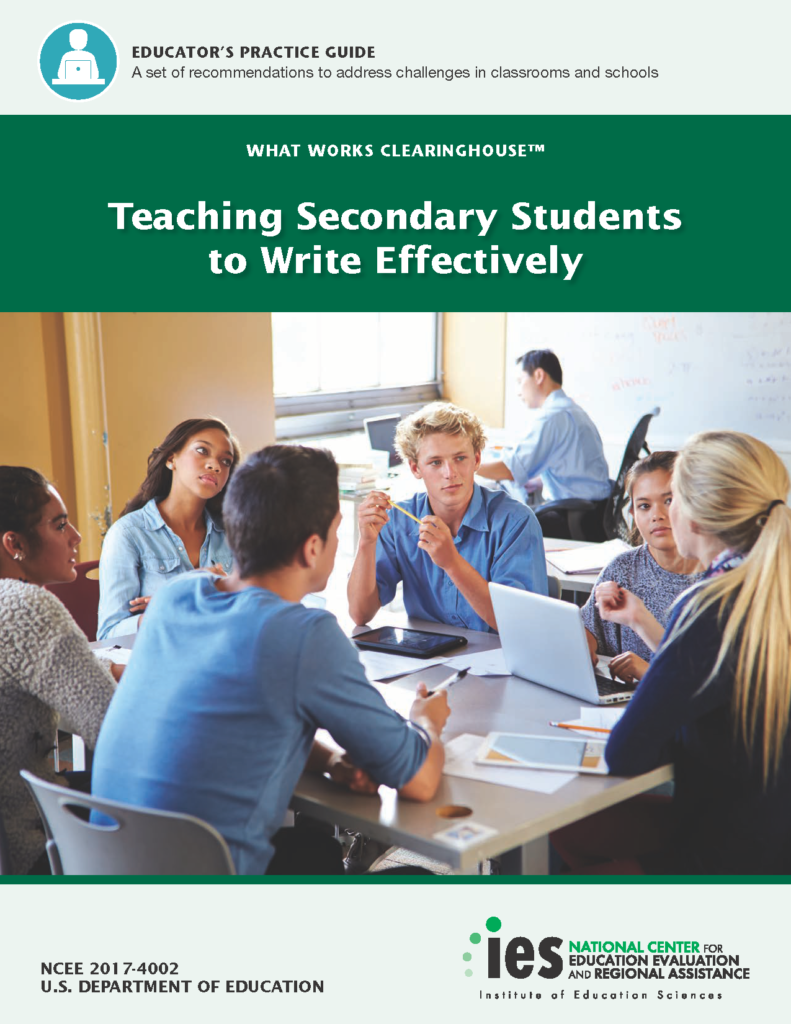 Teaching Secondary Students to Write Effectively from the Institute of Education Sciences offers educators specific, evidence-based recommendations that address the challenges of teaching students in grades 6–12 to write effectively. This guide synthesizes the best publicly available research and shares practices that are supported by evi-dence. It is intended to be practical and easy for teachers to use. Download the Report (PDF)
Teaching Secondary Students to Write Effectively from the Institute of Education Sciences offers educators specific, evidence-based recommendations that address the challenges of teaching students in grades 6–12 to write effectively. This guide synthesizes the best publicly available research and shares practices that are supported by evi-dence. It is intended to be practical and easy for teachers to use. Download the Report (PDF)
 Global Best Practices: An Internationally Benchmarked Self-Assessment Tool for Secondary Learning was created by the New England Secondary School Consortium to equip high schools with a clearly articulated, step-by-step process they can follow to identify existing issues or needs, and to shape school-improvement plans and priorities. Download the Report Summary (PDF)
Global Best Practices: An Internationally Benchmarked Self-Assessment Tool for Secondary Learning was created by the New England Secondary School Consortium to equip high schools with a clearly articulated, step-by-step process they can follow to identify existing issues or needs, and to shape school-improvement plans and priorities. Download the Report Summary (PDF)
Download the Web-based Version
- The Surprisingly Powerful Influence of Drawing on Memory is a report that explores whether drawing to-be-learned information enhanced memory and found it to be a reliable, replicable means of boosting performance. Download the Report (PDF)
- If They Think, “I can”: Teacher bias and youth of color expectations and achievement this article examines one key social actor that plays a prominent role in the formation of student expectations and academic achievement is the classroom teacher. Scholars argue that teacher support, in the form of beliefs about students’ academic abilities, is crucial. Download the Report (PDF)
Using Formative Assessments to Tailor Instruction and Supports
- Using Data and Formative Assessment to Drive Instruction from Research for Better Teaching Empowering Sustainable School Improvement. Download the Report (PDF)
- The Students in Front of US: Reform for the Current Generation of Urban High School Students Jefferson County Public Schools high school educators implemented Project Proficiency (PP). Results from state-administered mathematics tests demonstrated that all participating schools reported substantial increases in student proficiency. We examined the impact of PP on the performance of students, who met dropout predictive criteria established by Balfanz, Herzog, and MacIver. Study results suggested that PP students at risk of dropout realized meaningful and statistically significant achievement gains. Download the Report (PDF)
Integrating Social, Emotional, and Academic Development
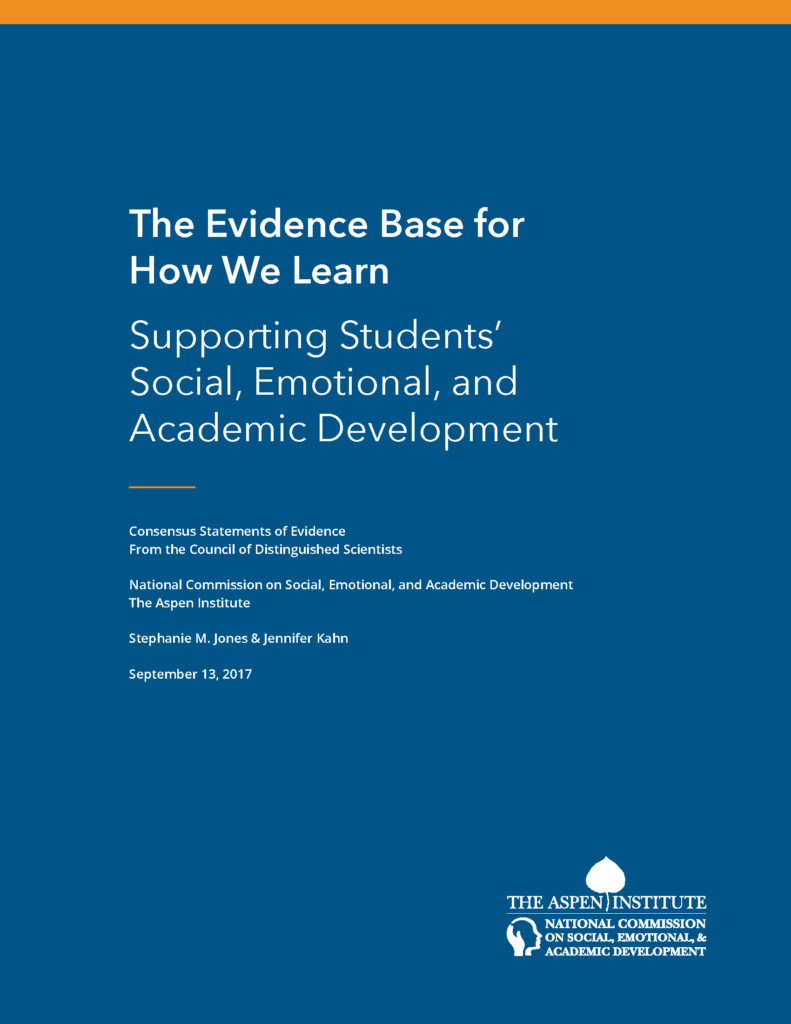 The Evidence Base for How We Learn Supporting Students’ Social, Emotional, and Academic Development by the National Commission on Social, Emotional, and Academic Development The Aspen Institute. A 20 page report that shows compelling research demonstrates what parents have always known—the success of young people in school and beyond is inextricably linked to healthy social and emotional development. Download the Report (PDF)
The Evidence Base for How We Learn Supporting Students’ Social, Emotional, and Academic Development by the National Commission on Social, Emotional, and Academic Development The Aspen Institute. A 20 page report that shows compelling research demonstrates what parents have always known—the success of young people in school and beyond is inextricably linked to healthy social and emotional development. Download the Report (PDF)
Read the Full Report Online (PDF)
 Supporting the Whole Teacher from The Aspen Institute highlights the need for teacher preparation and professional learning to both build teachers’ own social and emotional competence and prepare teachers to foster these skills in their students. The case study cites key examples of programs supporting teachers in this work including RULER, an evidence-based program that trains teachers on how to model the social and emotional behaviors they want to see in their students, and the Center for Reaching and Teaching the Whole Child, which works with teacher preparation programs to help integrate teacher and student social and emotional competencies into their classes. Download the Report (PDF)
Supporting the Whole Teacher from The Aspen Institute highlights the need for teacher preparation and professional learning to both build teachers’ own social and emotional competence and prepare teachers to foster these skills in their students. The case study cites key examples of programs supporting teachers in this work including RULER, an evidence-based program that trains teachers on how to model the social and emotional behaviors they want to see in their students, and the Center for Reaching and Teaching the Whole Child, which works with teacher preparation programs to help integrate teacher and student social and emotional competencies into their classes. Download the Report (PDF)
- Science of Learning and Development: A Synthesis human development derives from the continuous interaction between the individual and the context of each individual’s relationships and experiences. Development is shaped by a convergence of individual, biological, contextual, cultural, and historical factors. Download the Report (PDF)
- What Do Test Scores Miss? The Importance of Teacher Effects on Non-Test Score Outcomes issued by Northwestern University Institute for Policy Research. The paper extends the traditional test-score value-added model of teacher quality to allow for the possibility that teachers affect a variety of student outcomes through their effects on both students’ cognitive and noncognitive skill. Download the Report (PDF)
- Social-Emotional Learning Programs for Adolescents by David S. Yeager and The Future of Children poses the questions, do SEL programs work for adolescents? If so, how well and under what conditions? And how can they be improved? The article reviews these questions and SEL programs that try to help adolescents cope with their difficulties more successfully by improving skills and mindsets, and they try to create respectful school environments that young people want to be a part of by changing the school’s climate. Download the Report (PDF)
- WWC Intervention Report: My Teaching Partner–Secondary by the Institute of Education Sciences is a professional development program that aims to increase student learning and development through improved teacher–student interactions. Download the Report (PDF)
Developing Cultural Competencies
- Science of Learning and Development: A Synthesis human development derives from the continuous interaction between the individual and the context of each individual’s relationships and experiences. Development is shaped by a convergence of individual, biological, contextual, cultural, and historical factors. Download the Report (PDF)
- Rehumanizing the “Other”: Race, Culture, and Identity in Education Research in this excerpt from Review of Research in Education March 2016, Vol. 40, the authors examine the trajectory of the literature on race, culture, and identity in education research through the past century. The authors also explore the body of education research—from the mid 20th century to today—focused on the relationship between cultural and racial identities and students’ experiences with schooling. They close with a vision for the next era of research on this critical topic. Download the Report (PDF)
- Supporting English Learners and Students with Disabilities strategies From Turnaround Schools in Massachusetts. Download the Report (PDF)
Teaching & Learning During COVID-19
- Summative Assessment in Distance Learning Whether schools are using regular grades or not, teachers need to accurately assess learning while their students are at home. This article features many helpful ideas to consider at: https://www.edutopia.org/article/summative-assessment-distance-learning
- Teacher Agency during Remote Learning Teachers who have the agency to design remote learning that gives students hope and joy can find their own joy in teaching. Read the article at: https://www.nextgenlearning.org/articles/teacher-agency-during-remote-learning
- The Science of Remote Learning This resource is written in plain language to be broadly applicable to professional educators and non-professionals: teams designing remote learning experiences, people supporting at-home learning including parents, and learners at any level (if they have the prior knowledge to comprehend the text.) Download the Report (PDF)
- TNTP Learning Acceleration Guide-very detailed set of resources and tools to support an acceleration rather than remediation approach to filling in COVID-19 learning gaps. Download the Guide (PDF)
- How Brain Research Helped ReTool or School Schedule for Remote Learning at: https://www.edsurge.com/news/2020-06-10-how-brain-research-helped-retool-our-school-schedule-for-remote-learning
- How Student Agency Can Ease the Pain of Remote Teaching and Learning at: https://www.edsurge.com/news/2020-06-11-how-student-agency-can-ease-the-pain-of-remote-learning-and-teaching
- Exploring the Evidence on Virtual and Blended Learning Prepared by the Research Alliance for New York City Schools, May 2020. These notes provide an evolving overview of research and practical guidance on strategies to implement remote teaching and learning, as well as strategies that combine virtual learning with in-class instruction. Download the PDF
- Remote Learning: Rapid Evidence Assessment This rapid evidence assessment aimed to investigate methods that schools could use to support remote learning during school closures caused by the 2020 coronavirus pandemic (Covid-19). The review sought to find the best evidence behind the wide array of approaches that schools might choose to use during the crisis. Download the PDF
- Virtual Portfolio Defense Toolkit A guide to desgining authentic culminating assessment in the virtual space. Download the Toolkit (PDF). Get more information on Envision Learning Paterners webinar series at https://envisionlearning.org/virtual-defenses/
- The “Big 7” – Evidence-based Strategies for Regulating Emotions In Uncertain Times a webinar with Dr. Marc Brackett, director at the Yale Center for Emotional Intelligence, discussing how we can grow our emotion regulation skills, and apply them to a variety of situations at https://www.youtube.com/watch?v=ctSWJ2BLDC8&feature=youtu.be
- Seven Early Lessons About Shifting Education During a Crisis seven lessons can be of use to other districts, schools, and charter networks that are making major transitions during the pandemic at https://fordhaminstitute.org/ohio/commentary/seven-early-lessons-about-shifting-education-during-crisis
- Schools May be Closed, But Minds Are Still Open they say when the going gets tough, the tough get going. And that’s exactly what the education community did in this time of need. Dozens of education organizations are participating in the Wide Open School partnership. It’s a place where educators and families can find trusted learning resources, including: safe technology and media appropriate for students, learning experiences organized by subject and grade, suggested daily schedules at https://wideopenschool.org/?utm_source=XQ%3A+Give+Me+Five+Newsletter&utm_campaign=6a7d7b9aa9-giveme5_issue_10_COPY_01&utm_medium=email&utm_term=0_fff7d23e53-6a7d7b9aa9-66456997
- Teacher, Interrupted: Leaning into Social-Emotional Learning Amid the Covid-19 Crisis what can we do to support ourselves and our students in getting through these difficult times? We need to look to social and emotional learning (SEL) for evidence-based practices to help us now and to support us when we eventually return to school at https://www.edsurge.com/news/2020-03-18-teacher-interrupted-leaning-into-social-emotional-learning-amid-the-covid-19-crisis
Implementing Evidence-Based Strategies
This section examines the “how” and “why” of the evidence and research base and supports core principles to consider when redesigning high schools.
Implementing evidence-based practices is a human endeavor and an ongoing process. It requires continuous self-reflection on the ways we teach and use students’ work as indicators to determine the success of meeting the needs of diverse learners.
The resources in the section includes research and successful teaching and learning experiences and applications that may be used to bring together effective teaching approaches while leveraging resourcefulness and proven classroom strategies and techniques to improve students and teachers’ learning.
Student Agency
21st Century Skills for All Students the most socio-economically advantaged students in the United States and in Hong Kong performed at about the same level on collaborative problem solving skills on PISA 2015. Read more. . .
Student-Centered Learning
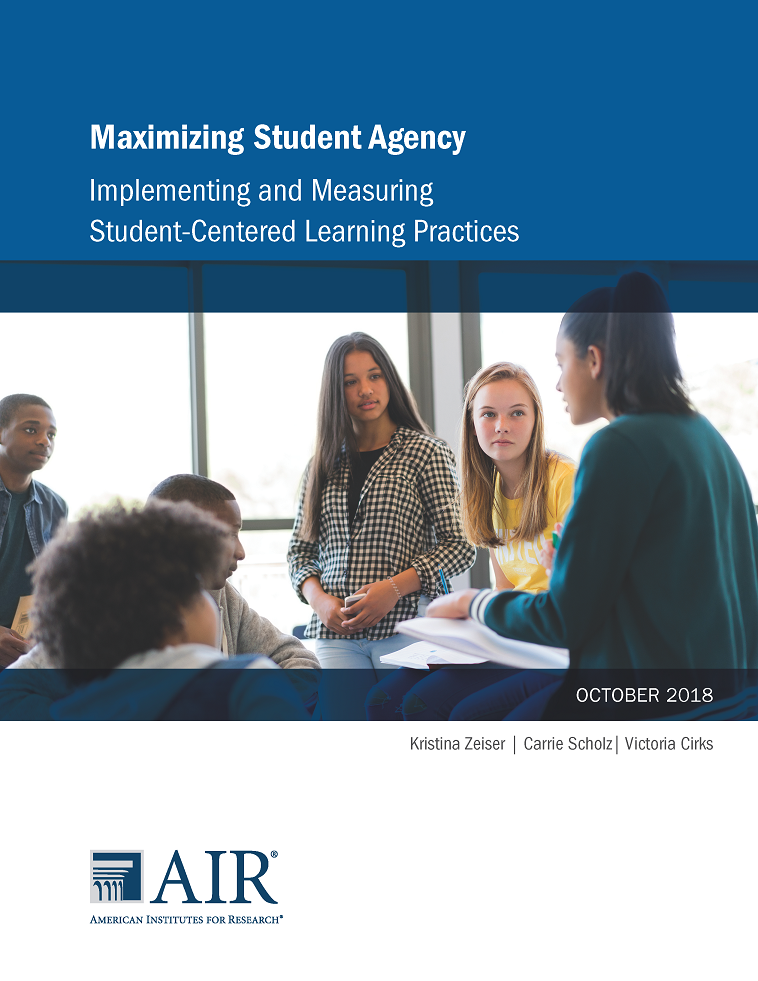 American Institute for Research worked with four New Tech Network (NTN) high schools in three states for the 2018 study Maximizing Student Agency: Implementing and Measuring Student-Centered Learning Practices to determine which teacher practices help or hinder the development of student agency, and whether these practices are effective across educational contexts and with different student subgroups. Download the Report (PDF)
American Institute for Research worked with four New Tech Network (NTN) high schools in three states for the 2018 study Maximizing Student Agency: Implementing and Measuring Student-Centered Learning Practices to determine which teacher practices help or hinder the development of student agency, and whether these practices are effective across educational contexts and with different student subgroups. Download the Report (PDF)
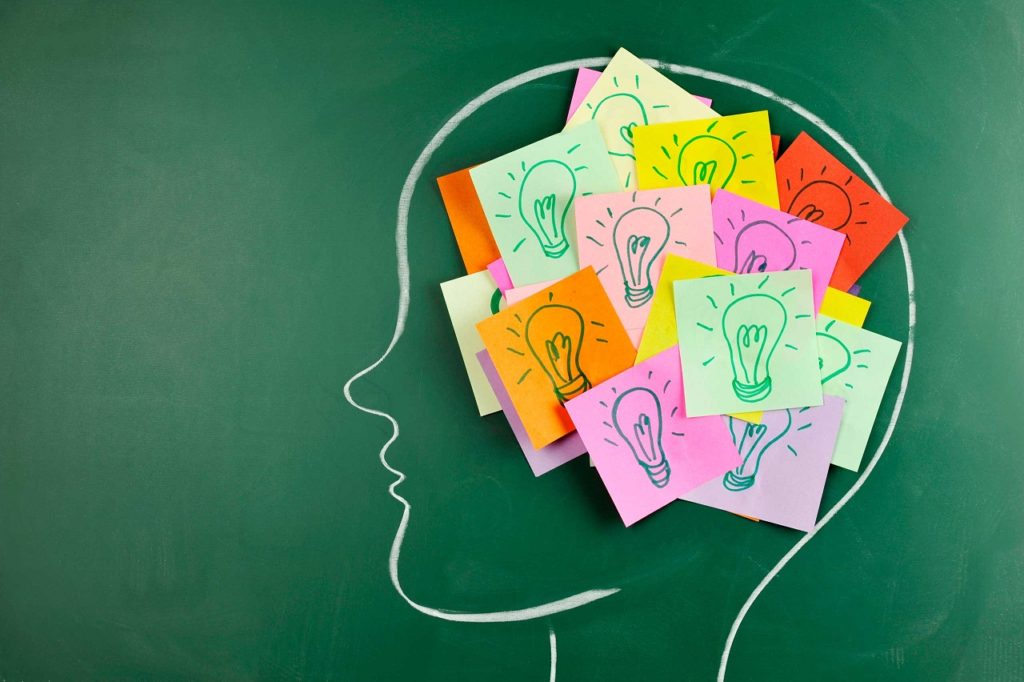 The Surprisingly Powerful Influence of Drawing on Memory is a report that explores whether drawing to-be-learned information enhanced memory and found it to be a reliable, replicable means of boosting performance. Download the Report (PDF)
The Surprisingly Powerful Influence of Drawing on Memory is a report that explores whether drawing to-be-learned information enhanced memory and found it to be a reliable, replicable means of boosting performance. Download the Report (PDF)
 Over 2,000 students participated in the New York Times’ second annual December challenge to “connect what you’re learning in school with the world today,” and, as you’ll see from the work of the winners, this year’s best were just as insightful and imaginative as last year’s. Read the New York Times Article
Over 2,000 students participated in the New York Times’ second annual December challenge to “connect what you’re learning in school with the world today,” and, as you’ll see from the work of the winners, this year’s best were just as insightful and imaginative as last year’s. Read the New York Times Article
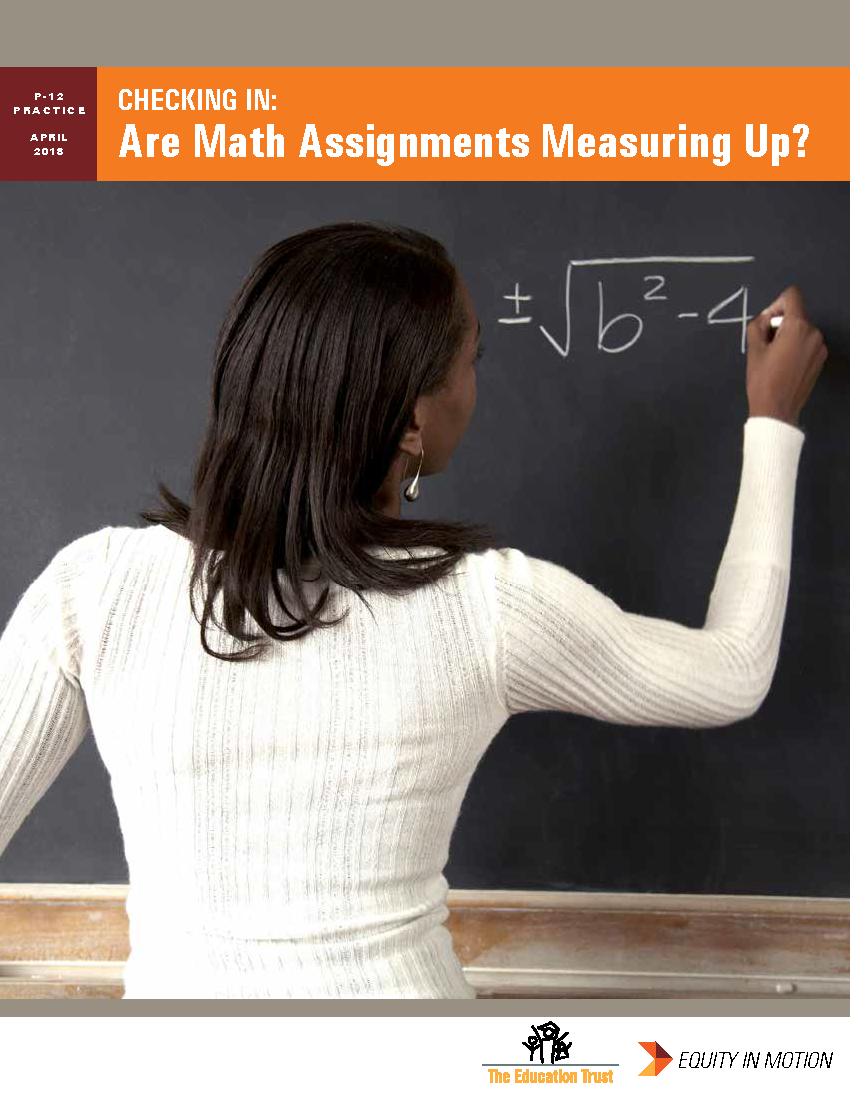 Are Math Assignments Measuring Up? Students can do no better than the assignments they’re given. That simple idea has been a driving force for The Education Trust’s practice work since its inception in the 1990s. And it animates a new generation of that work today, which involves analyzing classroom assignments in the context of more rigorous common standards and calling teachers to action. This kind of painstaking analysis of the daily academic experiences of students provides hugely important insights into what teachers know and understand about college- and career-ready standards — and what those teachers believe students
Are Math Assignments Measuring Up? Students can do no better than the assignments they’re given. That simple idea has been a driving force for The Education Trust’s practice work since its inception in the 1990s. And it animates a new generation of that work today, which involves analyzing classroom assignments in the context of more rigorous common standards and calling teachers to action. This kind of painstaking analysis of the daily academic experiences of students provides hugely important insights into what teachers know and understand about college- and career-ready standards — and what those teachers believe students
can do independently as a result of their teaching.
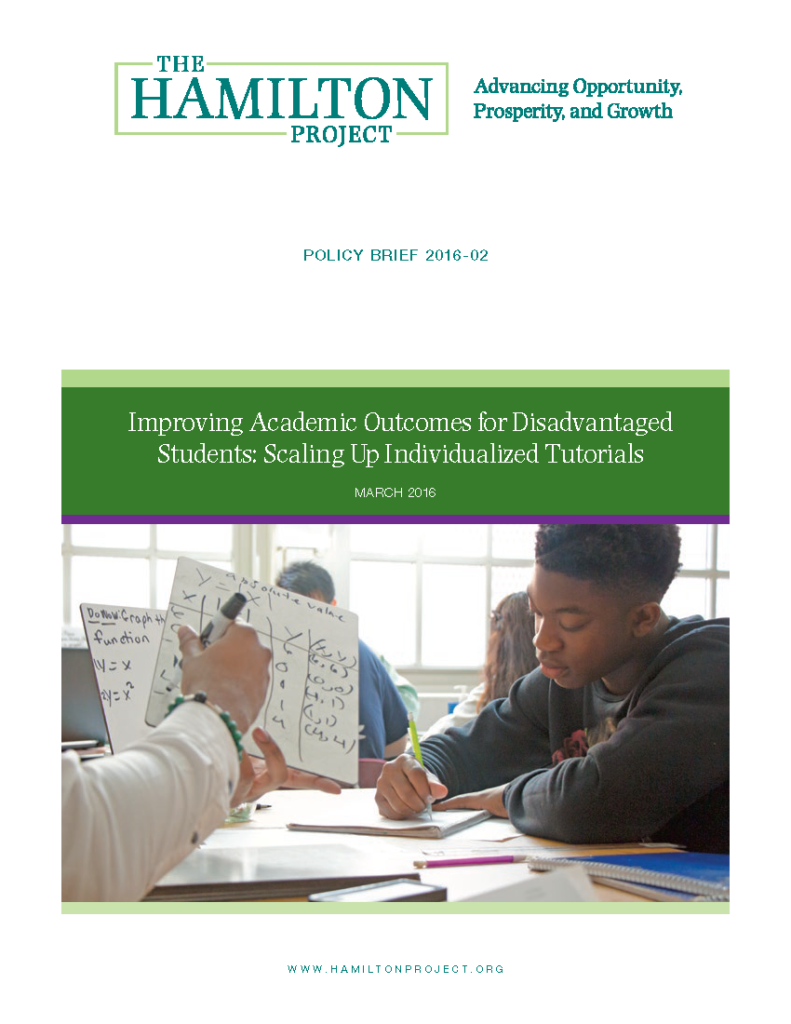 Improving Academic Outcomes for Disadvantaged Students: Scaling Up Individualized Tutorials prepared by The Hamilton Project examines the need for a more robust safety net for students who fall behind grade level is a key systemic challenge for many urban school districts. Download the Report (PDF)
Improving Academic Outcomes for Disadvantaged Students: Scaling Up Individualized Tutorials prepared by The Hamilton Project examines the need for a more robust safety net for students who fall behind grade level is a key systemic challenge for many urban school districts. Download the Report (PDF)
Student Motivation & Engagement
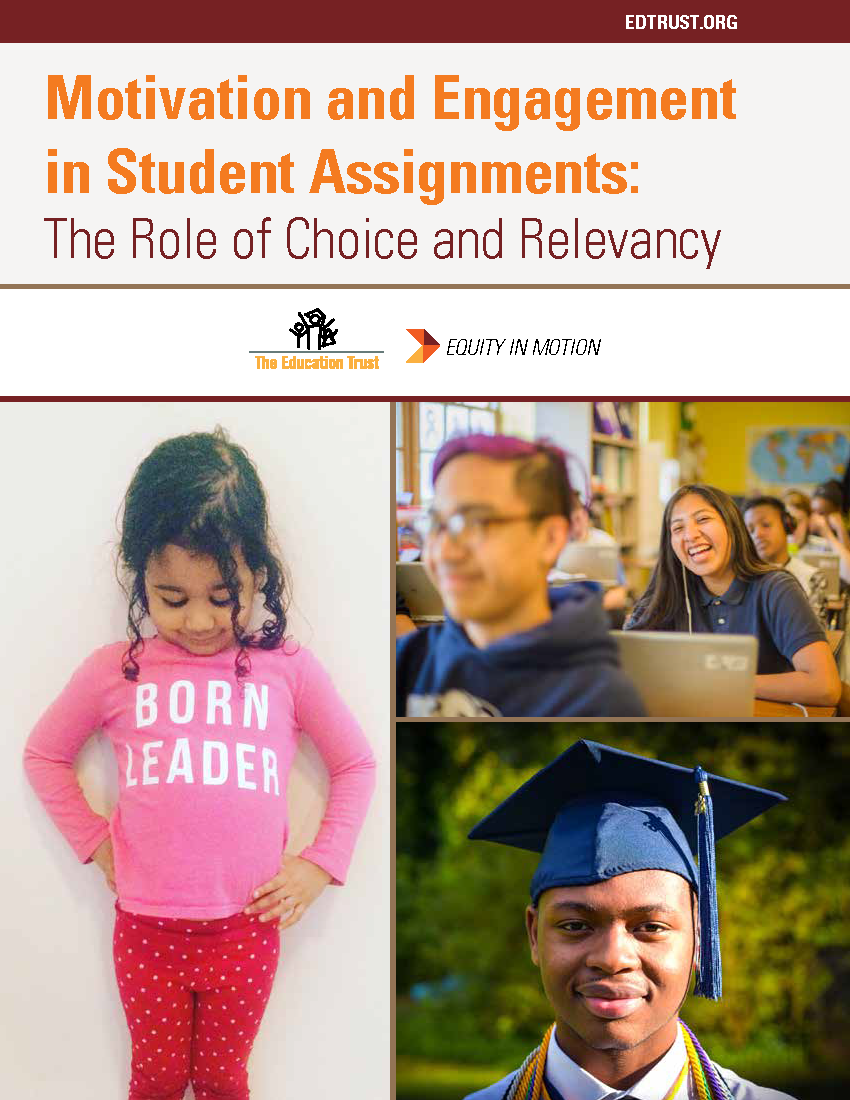 Motivation and Engagement in Student Assignments for students to thrive and achieve at high levels, they must be interested and emotionally invested in their learning. Why? Because motivation, or the desire that propels one to do something, leads to engagement, where students are being attentive to their tasks, putting forth positive effort, persisting through challenges, and advancing their ideas and understandings with a sense of intention. Download the Report (PDF)
Motivation and Engagement in Student Assignments for students to thrive and achieve at high levels, they must be interested and emotionally invested in their learning. Why? Because motivation, or the desire that propels one to do something, leads to engagement, where students are being attentive to their tasks, putting forth positive effort, persisting through challenges, and advancing their ideas and understandings with a sense of intention. Download the Report (PDF)
If They Think, “I can”: Teacher bias and youth of color expectations and achievement this article examines one key social actor that plays a prominent role in the formation of student expectations and academic achievement is the classroom teacher. Scholars argue that teacher support, in the form of beliefs about students’ academic abilities, is crucial. Download the Report
Learner-Centered Teaching
Educator Learning to Enact the Science of Learning and Development this report synthesizes research on how to support educators in developing those capacities both in preservice and in-service contexts. We take up both the “what” of teacher and leader preparation—the content educators need to learn about children and how to support their development and learning—and the “how”—the strategies for educator learning that can produce deep understanding; useful skills; and the capacity to reflect, learn, and continue to improve. Download the Report (PDF)
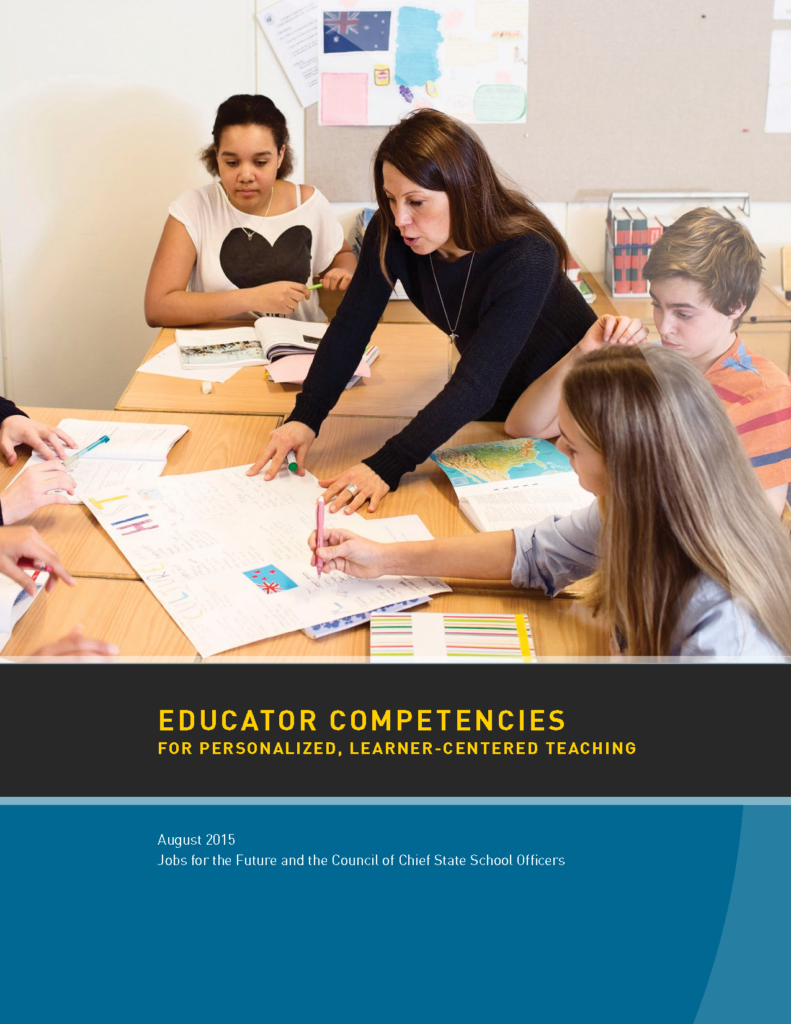 Educator Competencies for Personalized, Learner-Centered Teaching the development of Educator Competencies for Personalized, Learner-Centered Teaching serves as a first step in identifying the knowledge, skills, and dispositions that educators need in order to create and thrive in effective personalized, learner-centered environments. Download the Report (PDF)
Educator Competencies for Personalized, Learner-Centered Teaching the development of Educator Competencies for Personalized, Learner-Centered Teaching serves as a first step in identifying the knowledge, skills, and dispositions that educators need in order to create and thrive in effective personalized, learner-centered environments. Download the Report (PDF)
Designing Learning Communities
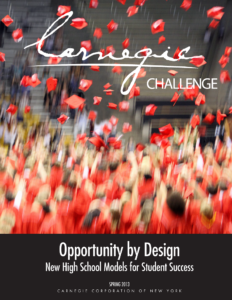 Opportunity by Design is a report produced by the Carnegie Corporation of New York examines while it is important to graduate from high school, high school is not an end in itself, but rather preparation for college as well as life-long learning. It is one part of the path that leads students towards their ultimate potential in any of endeavor as well as in personal satisfaction in their lives. To reach these goals, students deserve the best possible education that we can provide.
Opportunity by Design is a report produced by the Carnegie Corporation of New York examines while it is important to graduate from high school, high school is not an end in itself, but rather preparation for college as well as life-long learning. It is one part of the path that leads students towards their ultimate potential in any of endeavor as well as in personal satisfaction in their lives. To reach these goals, students deserve the best possible education that we can provide.
Podcast: Staffing for Student-Centered Learning
Betsy Arons, Geneviève DeBose, Hillary Salmons, and Michele Cahill answer questions and discuss ways to find and retain the best talent for your school. Featuring: Betsy Arons CEO of Urban Schools Human Capital Academy Geneviève DeBose National Board Certified Teacher and Commissioner of National Commission on Teaching and America’s Future Hillary Salmons Executive Director of Providence After School Alliance. Click to listen to the Podcast.
Classroom Q&A a teacher’s blog on Education Week’s website. In this post, Mr. Ferlazzo responds to the question: What are ‘Small Learning Communities’ (dividing large campuses into special interest small schools) and how do they work? Read the Post
Remote Learning Activities
- Project-Based Learning activities offered by Open Educational Resources at https://www.oercommons.org/curated-collections/395
- PBLworks offers Project-Based Learning activities designed for remote learning at https://www.pblworks.org/pbl-remote-learning
- Learn at Home Activities for Students offered by the New York City Department of Education are designed to provide K12 supplementary learning resources to students in the event that students may need to be home from school at https://www.schools.nyc.gov/learn-at-home/activities-for-students
- SEL Lessons Inspired by Dogs Are What Kids Need Right Now Just bringing in the topic of dogs is motivating for kids and promotes the kind of resiliency they need right now. That’s why we’re so excited about these resources from Mutt-i-grees—a Yale-developed social-emotional learning and humane education program from North Shore Animal League America—which are available for free now through June 30, 2020 at https://www.weareteachers.com/muttigrees-resources/?utm_source=MDR_WAT&utm_medium=Email&utm_campaign=NorthShore_1912_SpotArt
Implementing Early Warning Systems
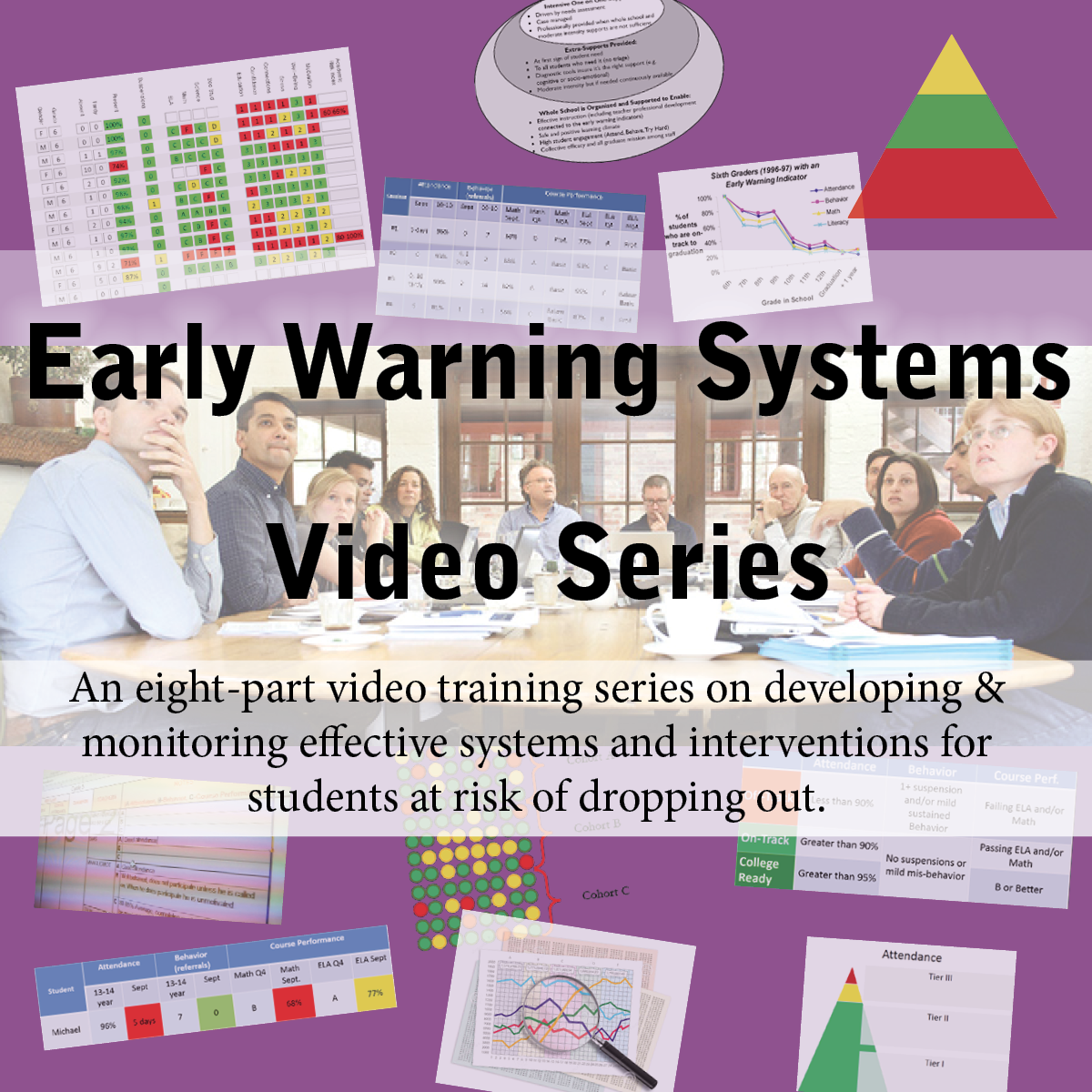
This eight-part, in-depth series examines the benefits and steps to implement an effective Early Warning Indicator program.
The free video series and materials go far beyond how to collect and interpret EWI data. It also examines building a data culture, linking indicators to a tiered inteventions system, planning EWS for schools and districts, how to get an EWS started including, how to introduce school staff and faculty to the system, intervention review and data gap analysis and much more.
Visit the EWI video series home page.
The video series was developed by the Everyone Graduates Center at Johns Hopkins University School of Education in partnership with the New Mexico Public Education Department, and the High Plains Regional Education Cooperative.
Restorative Practices & Building Equity
Video: Does Early College for HS Kids Boost Graduations?
A PBS’s NEWSHOUR feature that examines a South Texas high school that integrates early college learning into the high school curriculum in an a multi-cultural environment of poverty, English as second language, differing education levels, etc.
Podcast:
School Mission & Culture
Michele Cahill hosts a discussion with experts about how to build equity into 21st century learning environments. Featuring: Arva Rice President and CEO of the New York Urban League Sonja Santelises Vice President for K-12 Policy and Practice at the Education Trust Uri Treisman Professor of Mathematics and Director of the Charles A. Dana Center at the University of Texas, Austin. Click to listen to the Podcast
- The Challenge of Culture Change: Embedding Restorative Practice in Schools this paper seeks to broaden the perspectives of senior and middle management and restorative practitioners around what restorative practice in schools can look like; and to present some practical guidelines which represent a strategic approach to the implementation of restorative practices, so that they “stick” – that is, become sustainable. Download the Report (PDF)
Redesign in Action
See how these high schools are implementing evidence-based practices into their redesign.
Huntley High School: Blended Learning Program
Blended Learning—An innovative blended learning program at Huntley High School is breaking down the barriers of the traditional school day and leveraging technology to help students learn better. Blended Learning classes at Huntley High School Inspire, Challenge and Empower students to become self-motivated learners through both face to face and online instruction. HHS utilizes a Flex Learning Model of Blended Learning.
As a national pioneer of this increasingly popular approach, the District has been recognized in a national peer-reviewed journal, CNN, Parenting Magazine, the Pearson Education Blog, and other media outlets. Visit Huntly High School’s Website
Virtual Learning Academy: Competency-Based Learning
Competency-based Learning—Virtual Learning Academy (VLACS) is a New Hampshire online virtual public middle school and high school. VLACS offers students the opportunity to learn at their own pace, full or part time with 20,000 course enrollments. Visit VLACS’s Website
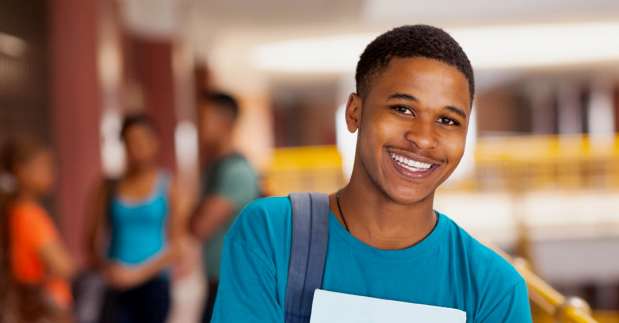 Some information about the program includes:
Some information about the program includes:
- Learn through courses, projects, internships, travel, etc.
- Registration is on-going. Students can start any time.
- Certified teachers work to establish positive relationships with every student.
- Complete a middle school program, earn a high school diploma, or an associate degree.
- Learn at a pace that meets the individual student’s needs.
- Students are welcome from any state or country.
- Any New Hampshire student can attend tuition-free!
- Offering full-time and part time opportunities for middle and high school students.
Bronx International High School
Bronx International High School is a progressive, team-based and community-based school dedicated to serving the academic and social needs of recently immigrated young people and their families. BIHS’s mission is to enhance students’ cultural awareness, English and native language proficiencies, and intellectual and collaborative abilities. These skills will empower them to become active participants in today’s interdependent and diverse world. By critically analyzing and responding to complex world issues, students will achieve academic, personal, and professional success, as they become advocates for themselves and their communities. Visit BIHS’s Website
Casco Bay High School
Casco Bay High School for Expeditionary Learning (CBHS) is a small and rigorous public high school that reflects the increasing diversity of Portland, Maine. Founded in 2005, CBHS is a school of choice for just under 400 students. Casco Bay challenges and supports students to become college-ready through our 3Rs: Rigor, Relevance, and Relationships. 98% of our graduates have been accepted to college. In 2017, CBHS was again named one of Maine’s top high schools by US News and World Report. CBHS is a credentialed school in the EL Education national network of schools, and one of the original “Mentor Schools.” In fall 2014, CBHS was named one of 20 “Deeper Learning” schools in the country and won the $100,000 Larry O’Toole Award from the Nellie Mae Foundation for advancing student-centered learning in New England. Visit the CBHS Website.
Seminole HS: XQ Super School
PSI High is an immersive, full-time program located within Seminole High School where students work in an environment that looks like a high-tech office instead of a classroom. Rather than learn through traditional instruction, our students join teams with their peers and teachers to solve real community, business,
and social problems.
The guide, Design Your Personal Learning Plan, from Problem Solving Incubator High School in Seminole County Public Schools provides an example for creating an individualized learning plan that combines face to face classroom experiences, individual advisors and project- based learning experiences across the school campus and community. Download the Guide (PDF)
Sandborn Regional High School
Sandborn Regional High School produced a nine-minute video focusing on Competency-Based Learning.
Sanborn Regional High School is a leader in competency-based learning. Located in New Hampshire, SRHS features flexible learning time to personalize instruction and provide students with support for intervention, extension and enrichment. Sanborn Regional High School is committed to sustaining a positive environment which promotes respect, academic excellence, and pride by encouraging independent thinking within a culture of collaboration.
Download SRHS’s Core Values & Beliefs and Learning Expectations (PDF)
Visit the SRHS’s Website
Shifting Mindsets on Teaching & Learning
Successful implementation of the pilars of redesign involves a shift from current mindsets to the evidence-based mindsets of redesign. To download the images, right-click the image and use the “Save As” funtion.
Media Center
Features the multimedia elements of the Teaching & Learning page.
One of the CSHSC’s goals is to maintain a nationwide network to share resources and experiences with other educators dedicated to redesigning the high school experience for all students.
Have a resource to share? Please share any useful resource, tool, website, etc. that you found helpful during your redesign. . .click here to share
Have a story to tell? Please share any experience, anecdote, cautionary tale you encountered during your redesign. . .click here to share

